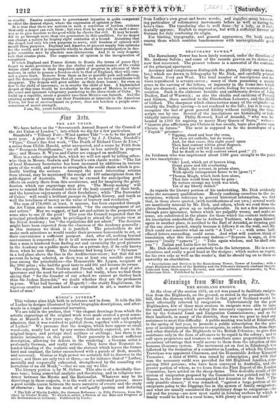3rto.
THE ART UNION.
We have before us the "Seventeenth Annual Report of the Council of the Art Union of London"; into which we dip for a few particulars.
Stanfield's "Tilbury Fort—Wind against Tide "—is to be the print of next year. A plate from "A Water Party" by J. J. Chalon, Goodall's "Piper," Cross's fine first work, "The Death of Richard Coeur de Lion," a series from Childe Harold, artist unreported, and a scene by Frith from the "Bourgeois Gentilhomme," are all more or less actively in progress also; and Messrs. B. Wynn and Carter are engaged on medallions.
Here is a rather singular fact, which we will not spoil by telling other- wise than in Messrs. Godvrin and Pocock's own classic words: "The list of local Honorary Secretaries has been increased by additions in various parts of the world, and serves to strengthen the social chain which is gra- dually binding the nations. Amongst the most interesting returns from abroad, may be mentioned the receipt of 150 subscriptions from the gold-diggers of Australia. We may be excused for anticipating good effects on society there from this occurrence, and for imagining the grati-
fication which our engravings may give. The Merry-making' will serve to remind the far-distant toilers of the leafy country of their birth, and the harmless enjoyments of their forefathers ; while The Surrender of Calais' will recall a brilliant passage in English history, and teach as well the loveliness of mercy as the value of bravery and resolution."
The sum of 170,000/. at least, it appears, has been expended through the Art Union since its commencement, "for the encouragement of art and artists." May we suggest, of bad art and artists in the proportion of some nine to one of the good ? This year the Council requested that the principal prizeholders might be privileged to attend the private view at the Royal Academy ; but "the regulations did not admit." The decision might have been expected from the closeness of the Academy generally ; in this instance we think it is justified. The prizeholders do not snake such selections as would render their presence honourable to art, or their convenience a sufficient passport. And, after all, nothing beyond convenience is concerned ; for it is all nonsense to pretend or insinuate that a man is hindered from finding out and examining the good pictures in the Academy on a public more than on a private day, if he only knows them when he sees them. The Academy had hung Lear's " Syracuse " in a bad place above the line in the Architecture-room ; but that did not prevent its being selected, as there was at least one sensible man this year among the prizeholders—the Honourable Mr. Lygon, recipient of the 2001. prize ; who had the good taste to add 50/. and became its owner.
The reporters, Messrs. Godwin and Pocock, talk a good deal of art- ignorance and the need for art-education : but really, when we find them saying that "for the founder of our school we cannot go farther back than Sir Joshua Reynolds," we doubt whether they are the professors in posse. What had become of Hogarth ?•—the sturdy Englishman, the vigorous creative mind and hand—an originator in art, a master of the heart of man ?


































 Previous page
Previous page